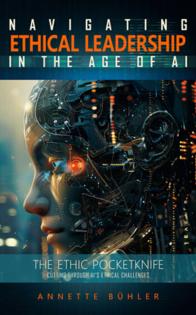Lead with confidence in the AI era with this ethical toolkit
Published in Mom's Advice
-- A company uses an AI system to streamline its hiring process, but the system favors certain demographic groups over others.
-- A hospital employs AI to diagnose patients but might miss rare conditions or produce false positives.
-- A bank uses AI to determine loan eligibility, but the system starts denying loans based on certain data patterns that are unfair to certain groups.
Those three examples are not presented to show the inadequacy of employing artificial intelligence. Quite the contrary. The fact is AI is penetrating wider applications in today’s world, quite often providing faster and more accurate results.
But without The Human Factor, there is always a chance for error. And in those cases, how do those humans, in this case the AI leaders and administrators in a given company, evaluate a situation from an ethical standpoint and take the proper action?
Good question. But not without good answers. That’s because Annette Bühler, raised in Switzerland and always fascinated by the reliability and functionality of the Swiss Army Knife, has authored a new book, "Navigating Ethical Leadership in the Age of AI," the cornerstone of which is her so-called Ethic Pocketknife to guide AI professionals in making hard AI-related ethical decisions.
The truth is AI systems are advancing at such a rapid pace that it’s nearly impossible for people to fully and fluidly grasp the ethical implications. Buhler notes that hardly a week goes by without a new AI-related ethical issue making headlines.
“With great power comes great responsibility,” writes Bühler. “The potential consequences of unethical AI use are significant, ranging from compromised privacy to biased decision-making.”
“Ethical leadership has never been more crucial as we navigate this complex landscape.”
The book was written to provide leaders with the tools and insights necessary to lead ethically in a society inundated with new technological advancements.
The book is divided into three parts: Foundations of Ethical Leadership and AI; Ethical Challenges and Solutions in AI; and The Ethic Pocketknife.
Some of the pillars of success in the new AI-dominated management model are not vastly different from any examination of what makes a good leader in general: integrity, fairness, transparency, responsibility, trust and empathy. It’s just that the stakes have been raised with a constantly changing technology landscape.
Bühler offers readers valuable guidelines, insights, perspectives and straight-out advice, peppered with many examples and case studies of corporations faced with tough ethical decisions and how they handled them. They make readers wonder how they would have dealt with a similar situation.
Her perspectives are all grounded in substantial research into leaders from around the globe. She also traces the history of AI and explains how it has penetrated such a wide number of industries and applications, from agriculture to real estate to medicine.
As complex as artificial intelligence might be, Bühler’s work is understandable and relatable, allowing readers to clearly understand the concepts and the implications. Her anecdotes are fully engaging, citing many companies that are household names. She does an excellent job of defining a situation, breaking down the key points of consideration, and putting them into a larger context.
Then, of course, there is Bühler’s very cleverly described Ethic Pocketknife, with every “blade” representing a different element of monitoring AI systems: integrity blade, diversity compass, transparency tweezers, fairness file, collaboration corkscrew — you get the idea!
Let’s face it, some people easily understand technological change, embrace it and often thrive in it. Others are simply terrified of it. Then there’s the matter of what it means to our daily tasks and jobs, whether this wonderous concept will simplify and enhance our tasks or cause confusion, uncertainty and, above all, ethical issues.
Annette Bühler has done us a huge service — and a favor. She has given us a primer on artificial intelligence, how it has affected our lives, and some guidelines to consider when it appears that AI and its use are overstepping boundaries that compromise what we know to be right.
“Ethical vigilance,” writes Bühler, “must be a continuous effort. This involves not just responding to immediate issues but also preparing for the unforeseen, fostering an environment where ethical considerations are always at the forefront of innovation.”










Comments